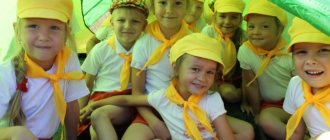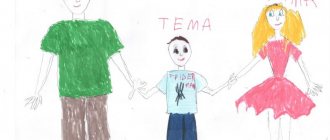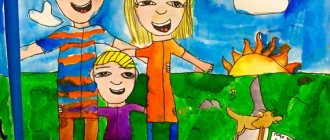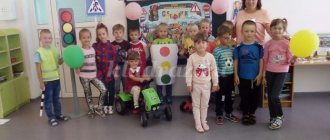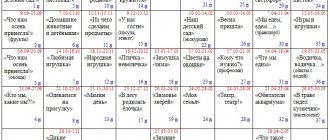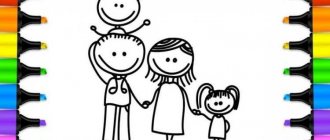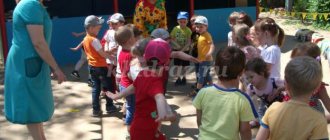Consultation for parents on the topic: “Family leisure: games, home holidays.”
Parent meeting on the topic: “Family leisure: games, home holidays, reading.”
Tasks:
introduce parents to the organization of leisure time for children in the family.
Form:
round table, exchange of experience in raising children.
Question for discussion:
What to do with your child in his free time.
Preparatory work:
surveying students, writing essays “My Family,” preparing invitations for parents.
Progress of the meeting.
—
Today at the meeting we will talk about organizing leisure time for children in the family. Leisure is a synonym for the phrase “free time”. Leisure is the part of non-working time that remains with a person after performing mandatory non-productive duties.
The inability to organize leisure time meaningfully and with benefit for oneself and others is an indicator of a person’s low culture.
On the other hand, interesting leisure is a means of comprehensive development of a person’s personality. K.D. Ushinsky wrote: “If a person does not know what to do during leisure hours, then his head, heart, and morality deteriorate.”
Activities included in the sphere of leisure can be divided into several interrelated groups. The first of these includes study and self-education in the broad sense of the word. These are various forms of collective and individual cultural development: visiting museums, exhibitions, theaters, entertainment events, reading books and periodicals, watching TV shows, etc.
Another group in the leisure structure is represented by various forms of amateur and social activities: independent or organized (cultural institutions and sports organizations) activities and hobbies (hobbies). These include traditional ones (collecting, choreography, poetry, painting, photography, physical education and sports, tourism, etc.), as well as more modern areas, for example, computer clubs, interest groups, etc.
An important place in the structure of leisure time is occupied by communication with other people (family leisure, friendly meetings at home, in nature, as well as in places of public recreation: gaming halls, clubs, etc.
In total, scientists count up to 300 forms of leisure. According to sociological studies, the daily fund of leisure time per person in the city is about 4-5 hours a day (28-35 hours a week). However, these indicators for primary school students are significantly higher. If you remove 10 hours a day for sleep and 5 hours for school, then 9 hours a day will be spent on leisure, minus 2 hours for preparing homework.
We also conducted sociological research in class to look at the organization of students’ leisure time.
(An analysis of the students’ answers to the first question of the questionnaire is underway: who was busy with what in their free time on a normal day. The floor is given to those parents who have well organized their children for spending their free time)
A critical situation is developing in the field of physical culture and recreational leisure. According to sociological studies, from 85 to 90% of the adult population do not engage in physical education in organized forms, and about 60% do not do it independently. Of particular concern is the lack of interest in physical education and sports among young people. Last but not least is the lack of a healthy lifestyle among people.
(An analysis is underway of the students’ responses to the second answer of the questionnaire, which show that the guys do not want to attend the sections)
Family leisure, which performs the restorative function of the family, is aimed at restoring and maintaining health and satisfying various spiritual needs.
To assess the usefulness of leisure, two main criteria are used. The first is the amount of free time allocated for family leisure. And secondly, the content of leisure time. Both indicators are determined by the level of development of the spiritual world of the parents, the financial capabilities of the family, as well as the entire way of life. If a mother is forced to spend most of her time serving her household, then she has no free time left to organize family leisure time and her own vacation. Therefore, it is very important that each family member has a certain range of responsibilities at home, which will free up time for meaningful joint leisure.
(Analysis of student responses to the third question of the questionnaire. Speech by parents who organized an interesting day off)
The worst thing is that parents almost never go to the theater with their children.
(Analysis of answers to question 5 of the questionnaire. Speech by parents who find time to visit the theater)
It’s gratifying that parents love to relax in nature.
(Analysis of answers to question 6 of the questionnaire)
As a result of the survey, it turned out that what parents love most is receiving guests.
(Analysis of answers to question 7)
It all depends on the mood with which the whole family approaches the organization of this or that event, how passionate everyone is about the process of preparing and spending weekends, holidays or just a quiet family evening. Family leisure should bring pleasure to each family member from meaningful, friendly communication, from the fulfillment of their needs for movement and knowledge. Then it has a developmental effect on children and adults and increases their cultural level. The formation of family traditions in spending free time is the key to a happy, friendly family, in which there is no room for bad habits (alcoholism, smoking, drugs) and misunderstanding, alienation, and boredom. A child who grows up with good traditions gradually develops an “image of family”, which he carries through his life, and, becoming an adult, creates his own family based on love, respect for each other and joint common affairs.
I would like to dwell on organizing family holidays. A holiday is a day dedicated to rest on the occasion or in memory of an event (religious, state). Based on this, family holidays are organized vacations on the occasion of some significant event for all members. Traditionally, these include birthdays, christenings, weddings, farewells, etc. Each family can have its own holidays. For example, a relative’s return home from a trip, the beginning or end of school life, outstanding achievements in sports, etc.
The most traditional family holiday is the birthday of one of its members. Children usually look forward to it. However, it is very important that it be remembered not only by the number of gifts.
(Analysis of answers to the last question of the questionnaire)
A child's birthday party will be successful if parents are able to organize it correctly. First of all, you need to remember that a child’s birthday is his holiday. Therefore, everything that happens on this day should bring pleasure to him. Experience shows that very often parents invite relatives and friends, set the table, make the same toasts and in the end forget about the birthday boy, who is left to his own devices. To avoid this, it is good to organize his favorite games, cook what he loves. You can discuss in advance with your child the activities that will be interesting to him.
Questionnaire.
- What did you do in your free time (for example, any day of the week)?
- What sections do you attend?
- Did (the boys) receive congratulations for the Defender of the Fatherland Day?
- What were your parents doing on this holiday?
- When was the last time you went to the theater with your parents?
- When was the last time you were outdoors with your parents?
- Do guests often come to you?
- How do your parents organize birthday parties for you?
Parent meeting decision:
1. Encourage the child to attend additional classes (clubs, sections, etc.)
2. Involve in reading books.
3. Unobtrusively control how the child spends his free time.
4.Parents find time to spend with their child.
5. Involve the child in household chores.
Parent meeting summary
“Organizing leisure time for children in the family”
Hello, dear parents! We are very glad to see you here today, and we want to express our gratitude that, despite your busy schedule, you took the time to attend our parent meeting!
The topic of today's parent meeting: “Organizing leisure time for children in the family”
Form:
round table, exchange of experience on organizing leisure time in the family.
Target
: increasing the level of competence of parents in matters of organizing leisure time in the family.
Tasks:
1. Introduce parents to some forms of joint leisure with their child.
2. Give practical recommendations to parents on organizing leisure time with their children at home; how can a joint vacation be turned into an exciting, and most importantly useful hobby (tradition) of the family? .
3. Encourage parents to spend time together with their children.
I propose the following agenda:
- Round table with parents on the topic “Organization of family leisure.”
- ____________________________________________________________
- ____________________________________________________________
- ____________________________________________________________
- ____________________________________________________________
The work week is coming to an end, the long-awaited weekend is approaching... Despite the fact that dad will probably want to get some sleep, and mom will want to start spring cleaning, it is important to remember the main goal of the weekend: to relax! You have two days to be together as a family and get a lot of bright impressions. And questions immediately arise: “How to spend a weekend with a child?”
In the dictionary of S.I. Ozhegova interprets of leisure time free from work .
Another concept
of leisure is part of non-working time, which is spent on restoring strength, as well as the physical and spiritual development of a person.
In total, scientists count up to 300 forms of leisure.
What is family leisure?
Family leisure
– free time that relatives spend together. This is a collective activity, the quality of which depends on such factors as: the level of culture and education in the family, the level of family wealth, age, individual characteristics and interests of each family member. Family leisure allows you to unite the family with a common cause.
It has an educational and developmental effect on all aspects of a child’s life, introduces him to the study of the riches of spiritual culture, realizes the best that is in a person, and allows him to resolve his own shortcomings with the help of creative activity.
Often in families, parents spend their leisure time pursuing their favorite hobby or watching TV, which very often does not coincide with the wishes of the children. At the same time, problems arise in the family, quarrels that could have been avoided. All this happens due to improper organization of family leisure. It is necessary to distribute your free time in such a way that it is enough to meet the needs and requirements of each family member.
The culture of family leisure undoubtedly depends on the culture of the parents, on how and with what they themselves fill their free time. If leisure time in the family is spent primitively, this also affects the child. Hence the most important parental task is to teach children to relax for health benefits. If parents have any hobbies, children willingly share them. How parents spend time with their company has a big influence on children. If a parent company organizes joint hikes, family sports events, diversifying them with games for children, then this leaves an imprint on children’s group leisure activities. In organizing free time in the family, what is important first of all is not the means, but the knowledge of how to fill the leisure time.
Happy childhood memories last a lifetime. This is how family traditions are born, which are passed on from generation to generation and family values are formed.
Types of family holidays
can be
active or passive.
Passive
rest is characterized by a state of rest that relieves fatigue and restores strength
What you are doing doesn’t matter, as long as you can be distracted, freed from tension, and get emotional release. Passive rest is an integral element of human life. It serves as a preparatory degree for more complex and creative activities.
Active
rest, on the contrary, reproduces a person’s strength above the initial level. A person enjoys movement, rapid changes in emotional influences, and communication with friends. Active rest, unlike passive rest, requires a certain minimum of fresh strength, willpower and preparation. Active family leisure is a very entertaining pastime, it is fun, entertainment, and new emotions for all family members.
Active family recreation can be schematically divided into sports and cultural.
Sports
recreation
gives work to the muscles and requires a certain minimum of fresh strength, willpower and preparation. Active sports leisure is simply a wonderful opportunity to have a great weekend or vacation, as well as get unforgettable emotions that you will not be able to forget for a long time.
Family sports
have a beneficial effect not only on the physical, but also on the neuro-mental health of family members. Now there are a lot of sports and entertainment complexes. Children definitely need to throw out their irrepressible energy somewhere on weekends. This can easily be achieved by devoting time to active recreation. Visit the pool, sports center, or skating rink with the whole family. You can take the whole family to the nearest water park. Yes, this is not the cheapest pleasure, but the children's delight completely pays for all the costs!
Invigorating walk
In winter, skiing or ice skating or bagel riding are also wonderful opportunities for family leisure.
Joint family trip to the forest
or to the river will be very useful for the harmonious development of the family, and will give parents the opportunity to remember “events of bygone days,” their own childhood and youth.
You can simply go with the whole family on a picnic, which can be short from a few hours and long to several days. Walking in the forest or by the lake
will not only diversify
family leisure time
, but will also help enrich the body with oxygen and improve immunity.
Cycling
is a very good pastime. On a trip like this there is always something to see. A bicycle ride is a real physical activity - even if it is not long, it is very good for health. It provides good aerobic exercise, which helps keep fit, improve metabolism, strengthen the heart, lungs and circulatory system. Biking with the whole family is a lot of fun and helps strengthen the family.
You can also go fishing
and organize family fishing competitions there to see who can catch the most in a certain period of time. After the first fish caught, the excitement awakens such that then it is impossible to drag anyone away from the pond.
With cultural
Recreation is associated with spiritual interests that encourage people to actively seek in the field of culture.
So, cinema
or
theater
. If your choice falls on the cinema, go to a funny family comedy or a funny cartoon. Theater is not just entertainment. During the performance, we receive educational information aimed at developing the intellectual sphere. Besides everything else, theater is also a school of feelings. Here we learn experiences, various emotions, and the skills of understanding the feelings of other people.
What child doesn’t dream of going to the circus
? Children's dreams must come true. After all, memories of a carefree childhood are always the most vivid and pleasant. A trip to the circus will be interesting for both adults and children.
Who said visiting an amusement park
– fun for children? In fact, this is the best opportunity not only to have a great time, but also to relax with the whole family. For any child and adult, regardless of age, it will be extremely pleasant to relax in this way.
In addition, you can go to educational events
, for example, to an exhibition or a museum. Every museum exhibit keeps a secret. Together with your child you can make fantastic journeys through time and space. Visit the museums of your city: a local history museum, an art gallery! Children of any age love animals. A visit to an exhibition of cats or tropical animals, a butterfly park, a circus, a zoo or a nature reserve, an ostrich farm, an aquarium or a dolphinarium will not leave either the child or his parents indifferent.
Family holidays help strengthen family relationships and express love and gratitude to loved ones
. These are solemn days dedicated to family happiness and well-being. Each family member has his own holiday, on which he receives congratulations from the people closest to him. Grandparents, mothers and fathers, and children have their own holidays. And we are talking not only about birthdays and name days, but also about special holidays, family ones, dedicated to family relationships. Family holidays allow us to express our love, feelings and gratitude to our closest and dearest people, strengthen relationships between different generations and contribute to the cultural and intellectual development of children.
In the age of development of electronic and computer technologies, many parents have completely forgotten about the existence of the most common and interesting board games for children. And often many people do not understand their necessity when a child can be given the same tablet, which has a bunch of different developmental programs. But children really need communication with their parents, their attention, care, understanding and love, which is manifested during classes. For board games, namely, to play them, neither special playgrounds nor the presence of certain equipment are required. They only need a table, although you can sit on the floor, as well as the game itself, which is already supplied by the manufacturer with all the necessary items - boards, cards, chips, dice, etc.
Board games are very good at helping to establish communication with loved ones. They help the child and parents establish relationships with each other, understand each other, and find ways to interact with each other. They certainly have a positive effect on mental development, mental development, and also help develop the child’s fine motor skills, personal qualities and abilities of the child. With the help of games, a child can be taught a lot, for example, to learn geometric shapes, numbers, letters, colors. Board games help develop attention, logic, imagination, visual memory, intelligence, and imaginative thinking. Games that require the participation of several players teach interaction between players. According to the rules of the game, sometimes you need to patiently wait for your turn to roll the dice and make a move, empathize, and accept both victory and defeat with dignity. Such games are very interesting to play for both children and parents.
What to look for when buying educational games?
Before purchasing a board game, you first need to familiarize yourself with its rules and make sure that your child will like it. A board game should fully correspond to the interests of the child, as well as his age. Only under such conditions can you hope that your child will really like the game. Typically, the age range of the game is indicated on the box itself. Still, you need to decide whether a particular game is suitable for your child. After all, all children develop differently, one child at three years old can put together puzzles quite fluently, while another will not be able to connect even two components. In addition, you must remember that if the game is too easy for your child, he will quickly lose any interest in it. Also, if it is quite difficult, then there is a high probability that the child simply will not understand it and will not be interested at all. A successful purchase can be considered purchasing a game that has different levels of difficulty. This gives more chances that this particular game can be of great interest and, moreover, for a fairly long period of time.
All board games are quite different and have different effects on the child. For example, some games develop verbal and logical thinking, while others are aimed at teaching comparisons. There are games that are designed to develop understanding of the size of an object, its shapes and colors. There are categories that make it easy and fun for children to learn numbers and mathematical symbols. Board games for the youngest children should be simple and, moreover, bright. These can be various cubes or pictures, from which you need to put together a picture of an object. You can purchase various cards that depict animals, various geometric shapes, show colors, and objects of various shapes. Puzzles and mosaics are excellent for developing fine motor skills and helping develop children's imagination. With three-year-old children, you can safely play dominoes or lotto. The peculiarity and advantage of board games is that they do not require much space at all, they bring great benefits to children, and also help them spend their free time, for example, when it is cloudy outside and it is raining or snowstorm. In addition, their price is quite reasonable, and often even low.
Do not rush to get upset if you have to spend the weekend with your child at home, and not in some new and interesting place. In fact, even at home you can find a lot of fun activities. Joint creativity brings parents closer together. The sooner you do something together, the better. Work should be carried out from simple to complex. It is advisable to set aside a special place on the shelf, on the table, where the child can study with mom, dad and other relatives. In a box or other suitable place, place a variety of traditional and non-traditional materials (crayons, paints, gouache, pencils, signets, stencils, colored paper, glue, etc.)
Reading books with your child is also a good form of leisure time.
However, as research and special observations show, the level of reading culture among a significant part of both children and adults is very far from the desired result. Many parents themselves read little and this conveys a not entirely “good”
example to your children.
Also, we don’t always discuss the book we read with our child or tell our favorite bedtime story. But the world of a fairy tale:
brings a little person the first joy of discovering the struggle between good and evil, awakens imagination, develops imagination.
And very rarely do we provide assistance in choosing literature. And this is important for children
When organizing a family vacation, don’t forget to take your camera with you! He will capture the brightest moments that you will scroll through in your memory, looking at the photo, and smile.
From all of the above, I would like to conclude that a family can brighten up any everyday life, the main thing is that there is mutual understanding, and love, an atmosphere of comfort and kindness should reign in the house.
The main thing is to educate
good habits of cultural recreation and remember at the same time that they are lost more easily than acquired. Positive leisure habits last a long time if they become a tradition.
We adults never feel sorry for our children. We give them the most delicious things, dress them in the best, protect them from diseases and misfortunes. But we give them our personal time more reluctantly than anything else. From the material family budget, we spend more and more money on food, clothing, education, entertainment for children, etc. And if you look at the expenditure of children’s free time, it turns out that our children experience a significant lack of parental communication.
Suggestion: make a photo report “Our family leisure” for the final parent meeting
Solution:
- Discussion with parents about the problem of the meeting is considered satisfactory.
- Please take note of recommendations and advice on organizing family leisure.
- Organize joint leisure time with children actively, purposefully, based on the age, psychological, and physical characteristics of the child, taking into account the desires and interests of each family member.
- Try to organize joint leisure time with your children actively and purposefully.
- Use different types of leisure activities: hiking, excursions, travel, picnics, get-togethers, drawing, modeling, appliqué, reading books, watching TV shows, various types of games.
- Be careful about children’s play ideas, buildings created during play, and creative works.
- Encourage the desire to find and attract play partners.
- Learn to understand and accept your child’s play behavior without criticizing.
- Try, by playing out situations familiar to the child, to create new game scenes and take part in them.
- Try to compose and learn word games together.
- While participating in the game, try to clarify the intentions and meaning of the child’s individual actions and report your own.
- Try to use holidays and birthdays for games.
- Teach children to play, develop creativity and imagination in joint activities.
- Try to practice word games and speech fantasy.
- Try to create games according to modified rules.
5 tips for planning your leisure time
- First, you should talk to your household and find out what they would like to do this coming weekend. If everyone has different desires, find a compromise option. Make a list that includes the interests of each family member. Agree with them on an action plan for the coming weekend.
- Start preparing for the upcoming event. For example, you decided to go skiing with the whole family this weekend. This means that mom must prepare the appropriate uniform for the entire ski team, and dad must prepare the skis.
- You always need to have a backup option. You're getting ready to go skiing, and there's a snowstorm outside. Replace your trip with watching an interesting movie or start preparing toys for the New Year. You should have everything ready for this activity.
- As you know, the best rest is a change in activity. This condition must be taken into account first. If dad worked hard all week, he obviously won’t want to go on a hike. In this case, it might be better if you let him rest and play an interesting board game in the evening.
- Organizing family leisure time involves preparing a “springboard”. What does this mean? If you are going to visit the pool or amusement park with your whole family, you need to have lunch ready when you return. Therefore, it must be prepared in advance. If you go hiking in the morning - tents, sleeping bags, provisions, etc. must be prepared in the evening.
A joint holiday with children is not only shared joy and fun, it is a strong bridge to mutual understanding, friendship and love.
A CHILD is a mirror of the family
Organization of family leisure
7
Joint participation in the competition: kindergarten preparatory group
- Sports competition - mothers and children come out. Three mothers start spinning a hula hoop at the same time. The one that scrolls longer will receive an extra point. Then the children jump ropes, the child who jumps the longest gets a point. The last task shared by children and mothers is to roll the ball into the goal. First the child, then the mother.
- Say the word - children must say the word with nuts in their mouths, and mothers must decipher what the child said.
- Find yours - the children stand in a circle. Each mother is blindfolded in turn and asked to guess her child.
- Prompt a poem - mothers are given the first lines of poetry. The mother uses pantomime to suggest the first line to the child, and he must guess and continue the verse.
- Shopping – There are plastic products on the table. The distance between the table and children is no more than 10 meters. Moms are given grocery lists. Each mother reads one item from the list to her child. The child runs up to the table, takes the item, throws it into the mother’s basket, and so on until he has completely “shopped.” The first couple to complete it faster wins.
MAGAZINE Preschooler.RF
Entertainment in the preparatory group together with parents “Play outdoor games with us”Goal: popularization of outdoor games among preschoolers.
Tasks:
- To develop interest in outdoor games in older preschool children.
- Encourage children to play together with their parents.
- To develop in children coordination of movements, speed of reaction, dexterity, ingenuity, and the ability to act in a team.
- Be able to organize your favorite outdoor game in the yard with other children.
Preliminary work:
- Introducing children to outdoor games during physical education classes;
- Learning counting rhymes and drawing lots;
- Making attributes for outdoor games.
Characters:
Buffoon, children, teacher, parents, music director.
Decoration of the hall: on the central wall are children's drawings “My Favorite Outdoor Game ,” silhouettes of children playing, diagrams of yard games for the older generation.
Progress of entertainment
In the corridor in front of the hall, a buffoon greets guests.
Buffoon:
Hello, kids, girls and boys. Thank you for not passing by, you came to see me for the holiday. Come in, don’t be shy, make yourself comfortable! How nice are you all:
Katyushka - Katyushka (Yana, Dashutka) is a golden-haired girl, And Vanyushka is a great guy and Arseny (Dima) is a daredevil. I’m glad to see everyone today, it’s time to open the holiday!
Educator:
Wait, buffoon, he invited us to a holiday and didn’t explain at all what kind of holiday would be here, the guests are waiting for an explanation. Buffoon: Our holiday is not simple - it is cheerful, mischievous!
Outdoor games and entertainment. Educator: Is there really such a holiday? Skomorokh: It happens. Friends! I open the door to the country of Igralia!
And dads have been there, and moms have all been there, believe me! Both grandmothers and grandfathers will give you the answer, There is no better country in the world than Igralia!
* Dear parents, hurry up, put off everything until tomorrow. We'll play together today! You are ready?
Then we count our fingers: One, two, three, four, five - Let's all start playing!
Your mothers and fathers loved to play this game as children: in the yard, during school breaks, and when visiting.
This is the Russian folk game "Golden Gate" .
Parents stand in a circle, hold hands and raise them, forming a “gate” . The rest of the players pass through the gate in a line. The drivers say the words:
The Golden Gate does not always allow entry:
The first time is forgiven, the second time is forbidden,
And we won’t miss you the third time!
The “gate” closes at the last word and catches whoever was passing through it at that moment. The caught player stands in a circle, the game continues until there are 2 - 3 players left.
Buffoon: Well played! Our guests have relaxed a little, let's play an outdoor game with them
"The quieter you go, the further you'll get"
Introduced us to this game...????????????????????????
We have made it more difficult; you need to carry the bag on your head to the leader and not drop it; whoever does not keep the bag on his head returns to the starting line of the game. (The game is played first with children, then with parents)
The baby raccoon was introduced to the game “Dragon” or “Tail of the Dragon” by two families at once...:???????????????????????????????? ?????
"head" must reach and touch the "tail" Once the head grabs the tail , it becomes the tail .
Buffoon: What games did your grandparents not play? For accuracy, strength, speed, agility. I invite you, dear guests and guys, to play the game “Hot Potato” , the Farzona family put a card with this game in Petya’s pocket:
Children stand in a circle and throw the ball to each other. Those who did not manage to catch sit in the center of the circle. Those sitting in the center can catch the ball without standing up to their full height.
to a very interesting game “I am a worm – a worm – a worm .
Children stand in a circle, the driver is in the center of the circle and moves around the circle, pronouncing the words:
I'm a worm, a worm, a worm! I'm crawling, crawling, crawling! Do you want to be my tail? (approaches the child) But you can’t refuse!
The child answers: “I want!” and crawls under his feet, continuing the game together, etc.
Educator: When I was still a little girl, we loved to play funny blind man's buff.
Skomorokh: And not only you, Yulia Viktorovna, liked this active game. Serezha Kulemin’s family continues to play the game “Zhmurki” :
One of the players, the “blind man’s buff ,” is blindfolded, taken to the middle of the hall and forced to turn around several times, then asked:
- Cat, cat, what are you standing on?
- In the kettle.
- What's in the kneader?
- Kvass.
- Catch mice, not us.
After these words, the participants in the game dodge, and the “blind man’s buff” catches them. Whoever he catches becomes a “blind man’s buff” .
Buffoon: What games did our guests play as children? Let's ask them.
The child questions the parents (interviews).
Buffoon: And now: 1, 2, 3, 4, 5, I want to Hopscotch . Guests are invited, they explain the game, and all the children play it.
Prepare different types of classics (from hoops, squares, a circle - divided into sectors), cue balls according to the number of children.
Educator: Dear guests! Thank you for participating in our holiday. Always be pure in heart and do not forget that you yourself were once children.
Let the girls and boys, All the mischievous children today say loudly, loudly, Long live the game! (pronounced in unison)
The children leave the hall to the music.
Presenter: -
— Dear children, parents, guests! Today we have an unusual activity. We will conduct this lesson with parents. Let's greet each other:
— Physical education
- Hello!
Formation into a circle.
- Let's get acquainted.
2. Game “Let's get acquainted” . (The instructor throws the ball to the children and parents with the words: “Hurry up, what’s your name, tell me...” The one who catches the ball says his name).
- physical and psychological leisure for children of the preparatory group with the involvement of parents “Favorite outdoor games of children and their parents .
The leisure time was prepared and conducted by physical education teacher O. V. Zubatova and teacher-psychologist Yu. V. Teslenko.
Goal: Strengthening children's health through outdoor games.
Objectives: To develop skills and abilities to act in a team of peers.
- Develop children's motor activity; enrich children's motor experience.
- Foster feelings of camaraderie, mutual assistance, and discipline.
- Involving parents in joint activities with children.
“My favorite outdoor game” was conducted among children and parents , which showed how different outdoor games were in the childhood of parents and their children. Popular games among parents were “Hide and Seek” , “Cossack Robbers” , “Rezinochka” , “Jumping Rope” , “Dodgeball” , etc. A survey of children “Your favorite outdoor game” showed that the most popular games among children now are different types of moving types with running, jumping, “Traps” , etc.
During leisure time, outdoor games and fun were held:
- p/i "Rezinochka"
Presenter - Guys, today I invite you to take part in a holiday dedicated to outdoor folk games.
“The Adventures of Pinocchio” plays , the fox Alice and the cat Basilio appear, arguing about something.
Alice - You think wrong, I will drive.
Basilio - No, you’re saying the wrong words, you don’t know the counting rhymes at all.
Alice - Now let me count and find out who will drive.
Host - Hello, friends, what are you arguing about?
Basilio - We wanted to play a game and we can’t agree on who will drive.
Host - It’s very simple, you just need to know the counting rhymes. Let me help you:
The peas were rolling on the dish,
You drive, but I won't.
Alice: Wow, how cool! Do you also know the counting rhymes?
Presenter: of course, and our children always count only according to popular calculations. You ask them, they will help you.
The guys help the guests pay.
Presenter: Our children very often use counting rhymes in games and know a lot of folk outdoor games. Do you know?
Alice and Basilio: Yes, “Bear” , “Geese” , “Chicken” , “Barrel” , “Blindfolds” ...
The host corrects the guests. “Bear the Bear in the Forest” , “Geese - Swans” , “Crested Hen” , “Blind Man’s Bluff”
Back massage "Rain" . (Parents massage their children).
Poems of Movement
The rain runs on the roof - Bom! Bom! Bom! Patting with palms on the back from top to bottom On the cheerful ringing roof - Bom! Bom! Bom! They tap their fingers.
At home, sit at home - Bom! Bom! Bom! Lightly tap your fists, don't go anywhere - Bom! Bom! Bom! Rub with the edges of the palms (sawing)
Read, play Bom! Bom! Bom! Place your palms on your shoulders and knead his shoulders with your fingers. And if I leave, then go for a walk... Bom! Bom! Bom! Stroke your back with gentle movements of your palms.
/and "Jumping"
- p/i "Bouncers"
- p/i "Trap with a hat"
- p/i “Trap, take the tape”
- p/i "Mousetrap"
- Entertainment "Parachute"
- Entertainment "Don't Drop"
- p/n “Don’t yawn”
- Relaxation game “Fox and Hares”
- Breathing exercise “Pump”
Parents were given the opportunity to remember the games of their childhood and play them with their children. Children and parents received a lot of emotions and impressions. All participants of the event were in a great mood.
| Next > |
